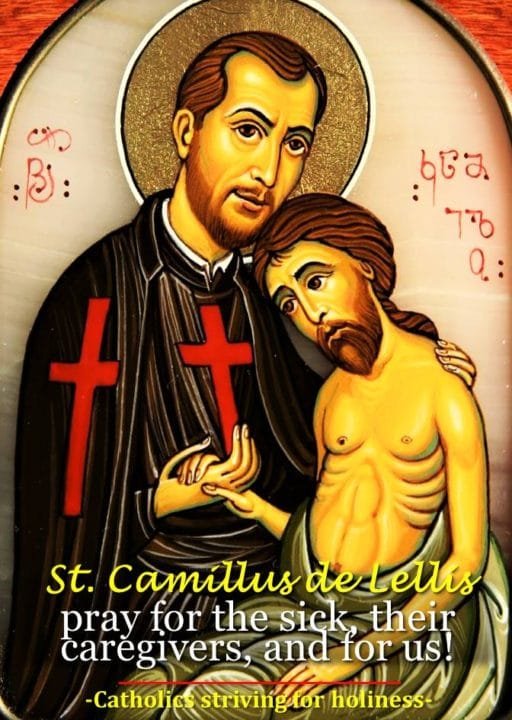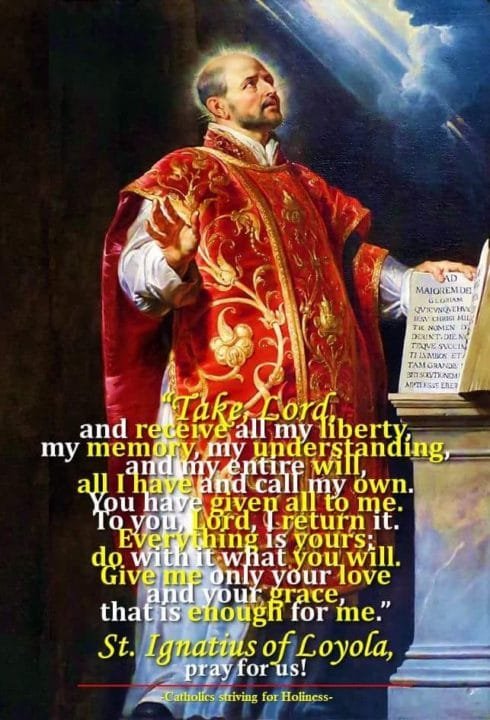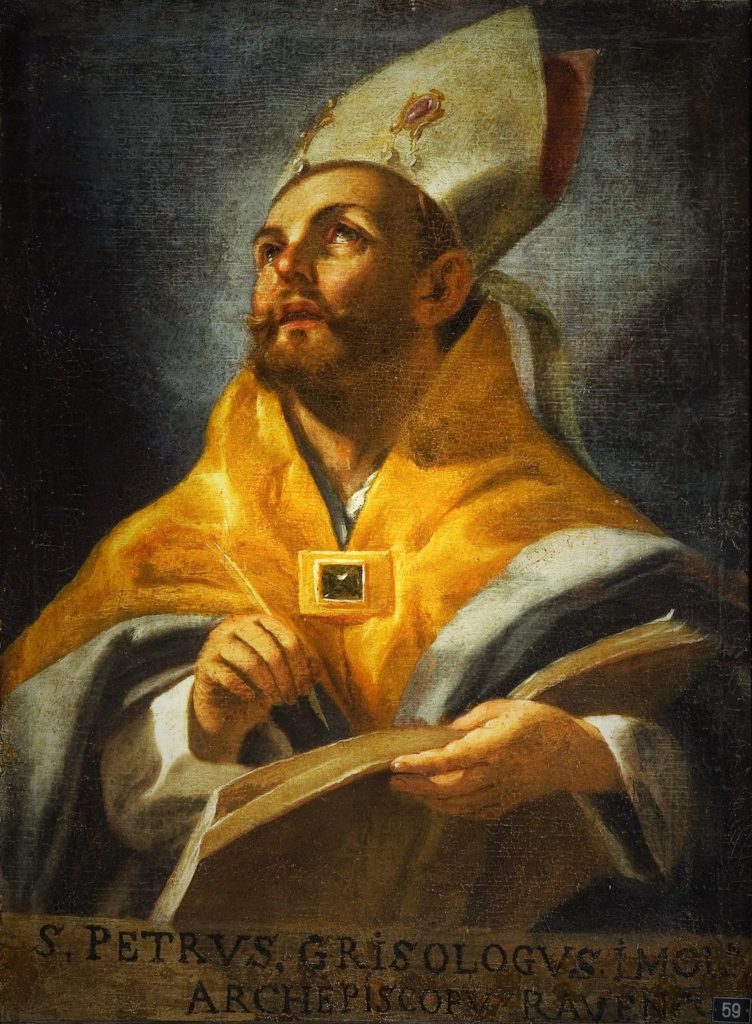July 14
ST. CAMILLUS DE LELLIS, Founder of the Order of St. Camillus (Hospitallers)
Biographical sketch + Divine Office 2nd reading
Born at Bucchianico, Abruzzo, 1550; died at Rome, 14 July, 1614. He was the son of an officer who had served both in the Neapolitan and French armies. His mother died when he was a child, and he grew up absolutely neglected. When still a youth he became a soldier in the service of Venice and afterwards of Naples, until 1574, when his regiment was disbanded. While in the service he became a confirmed gambler, and in consequence of his losses at play was at times reduced to a condition of destitution. The kindness of a Franciscan friar induced him to apply for admission to that order, but he was refused.
He then betook himself to Rome, where he obtained employment in the Hospital for Incurables. He was prompted to go there chiefly by the hope of a cure of abscesses in both his feet from which he had been long suffering. He was dismissed from the hospital on account of his quarrelsome disposition and his passion for gambling. He again became a Venetian soldier, and took part in the campaign against the Turks in 1569. After the war he was employed by the Capuchins at Manfredonia on a new building which they were erecting. His old gambling habit still pursued him, until a discourse of the guardian of the convent so startled him that he determined to reform.
He was admitted to the order as a lay brother, but was soon dismissed on account of his infirmity. He betook himself again to Rome, where he entered the hospital in which he had previously been, and after a temporary cure of his ailment became a nurse, and winning the admiration of the institution by his piety and prudence, he was appointed director of the hospital.
While in this office, he attempted to found an order of lay infirmarians, but the scheme was opposed, and on the advice of his friends, among whom was his spiritual guide, St. Philip Neri, he determined to become a priest. He was then thirty-two years of age and began the study of Latin at the Jesuit College in Rome. He afterwards established his order, the Fathers of a Good Death (1584), and bound the members by vow to devote themselves to the plague-stricken; their work was not restricted to the hospitals, but included the care of the sick in their homes.
Pope Sixtus V confirmed the congregation in 1586, and ordained that there should be an election of a general superior every three years. Camillus was naturally the first, and was succeeded by an Englishman, named Roger. Two years afterwards a house was established in Naples, and there two of the community won the glory of being the first martyrs of charity of the congregation, by dying in the fleet which had been quarantined off the harbour, and which they had visited to nurse the sick.
In 1591 Gregory XIV erected the congregation into a religious order, with all the privileges of the mendicants. It was again confirmed as such by Clement VIII, in 1592. The infirmity which had prevented his entrance among the Capuchins continued to afflict Camillus for forty-six years, and his other ailments contributed to make his life one of uninterrupted suffering, but he would permit no one to wait on him, and when scarcely able to stand would crawl out of his bed to visit the sick. He resigned the generalship of the order, in 1607, in order to have more leisure for the sick and poor.
Meantime he had established many houses in various cities of Italy. He is said to have had the gift of miracles and prophecy. He died at the age of sixty-four while pronouncing a moving appeal to his religious brethren. He was buried near the high altar of the church of St. Mary Magdalen, at Rome, and, when the miracles which were attributed to him were officially approved, his body was placed under the altar itself. He was beatified in 1742, and in 1746 was canonized by Benedict XIV.
[Note: In 1930, Pope Pius XI named St. Camillus de Lellis, together with St. John of God, principal Co-Patron of nurses and of nurses’ associations.]
SOURCE: http://www.newadvent.org/cathen/03217b.htm
Second Reading
From the Life of St Camillus
Serving the Lord in his brethren
Let me start with holy charity, the root of all the virtues and the gift most characteristic of Camillus. He was so fired by this virtue, both towards God and towards his neighbours, especially the sick, that just to see them was enough to melt his tender heart and to make him forget every pleasure, every earthly delight and attachment. Indeed, even when ministering to just one sick man, he seemed to burn himself up and wear himself out with the utmost devotion and compassion. Gladly would he have taken upon himself all their sickness and sufferings to alleviate their pain or take away their weakness.
So vividly did he picture and honour the person of Christ in them that often when distributing food to them he thought of them as his ‘Christs’, and would beg of them grace and the remission of sins. Hence he was as reverent before them as if he were really and truly in the presence of his Lord. Of nothing would he speak more frequently or fervently than of holy charity. He longed that it should take root in the heart of every man.
To fire his brethren in religion with this fundamental virtue, he would impress on them these sweet words of Jesus Christ: ‘I was sick and you visited me.’ Indeed, so often did he repeat these words, he seemed to have them engraved on his heart.
Camillus’ charity was so great and wide-ranging that he took to his kind and loving heart not only the sick and the dying but also all other poor and wretched people. His heart was so full of devotion for the needy that he used to say: ‘If ever there were no poor to be found on the face of the earth, people would have to search them out and even pluck them from below the earth in order to do good to them and show them mercy!’
Responsory
℟. Care for the sick, and always seek to do good to all,* for this is the will of God in Christ Jesus for you.
℣. Welcome one another as Christ has welcomed you, for the glory of God,* for this is the will of God in Christ Jesus for you.
Let us pray
O God, who adorned the Priest Saint Camillus with a singular grace of charity towards the sick, pour out upon us, by his merits, a spirit of love for you so that, serving you in our neighbor, at the hour of our death we may pass safely over to you.
ORIGINAL PHOTO SOURCE: http://mosaicomiocaso.com/wp-content/uploads/2014/03/sancamilo-mosaico_big.jpg
Stay updated: subscribe by email for free TO OUR NEW WEBSITE www.catholicsstrivingforholiness.org (PUT YOUR EMAIL IN THE SUBSCRIBE WIDGET).
We are also in www.fb.com/Catholicsstrivingforholiness. Kindly help more people in their Christian life by liking our page and inviting your family, friends and relatives to do so as well. Thanks in advance and God bless you and your loved ones! Fr. Rolly Arjonillo


